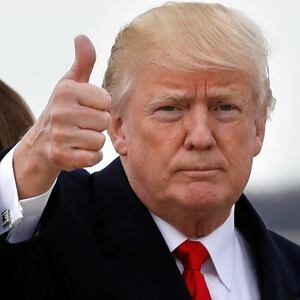There’s a theory that Elián González defeated Al Gore in 2000. Twenty years later, it’s not absurd to think that a similar dynamic might be shaping up as Venezuelan expats in south Florida are supporting calls for an uprising in solidarity with opposition leader Juan Guaidó’s bid to foment an internal rebellion.
No president since 1960 has been elected without Florida (except for Bill Clinton in 1992). Given that, it’s not hard to see how the turmoil in Venezuela could very well impact the 2020 presidential election.
According to a 2018 University of Miami study, more than 200,000 Venezuelans have settled in south Florida since 2014. To be sure, not all of them can (or will) vote. But when you consider that Donald Trump won Florida by fewer than 113,000 votes in 2016, you begin to see how this issue could prove vital for Trump’s reelection possibilities.
ADVERTISEMENT
“The path back to the White House for the president runs through Florida,” Brad Harold, who managed Ron DeSantis’ gubernatorial campaign, told me over the phone this week. “And [President Trump’s] strong stance on the pro-democracy movement in Venezuela is only going to help him among the Venezuela community in south Florida.”
He’s right. Not only is Florida one of a handful of states that will determine the next president, it’s nearly impossible to imagine a path for Trump’s reelection that doesn’t include Florida on the electoral map.
I’m not suggesting that Republican support for Guaidó isn’t sincere. But it is fair to say that this might be one of those rare times where philosophy and political strategy happily overlap.
Whereas Trump has strayed from the hawkish Republican line (at least rhetorically) when it comes to places like Syria, he has been crystal clear (with apologies to MSNBC’s Nicolle Wallace) when it comes to Venezuela.
Trump visited Miami back in February, proclaiming that “the days of socialism and communism are numbered. Not only in Venezuela but in Nicaragua and in Cuba as well.” Vice President Mike Pence has had several meetings with the Venezuelan exile community.
Both of Florida’s Republican senators are on board. Back in February, Marco Rubio tweeted out images of former Libyan dictator Muammar Gaddafi, whose regime was toppled in 2011. This was generally interpreted as a warning to Venezuelan strongman Nicolás Maduro. Not to be outdone, this week, Rick Scott started pushing for military intervention.
Unlike Trump, Rubio’s position is consistent. Rubio is the son of Cuban immigrants who has generally taken an interventionist approach to foreign policy, so it’s hardly surprising that he would be taking a hardline stance against Maduro. The fact that it’s also good politics is just icing on the cake.
What is more, the benefits could outlive the 2020 election cycle. The GOP’s support of Guaidó, juxtaposed with prominent progressives refusing to condemn the Maduro regime and accusing the U.S. of aiding a “coup,” are causing headaches for Florida Democrats. “Just like with the Cuban-American population, I see an opportunity to take that political support for a generation or more,” Michael Touchton, a University of Miami political science professor, told Fox News.
He’s not alone in his opinion. “As a lifelong Democrat, one of my fears is that the next generation of Venezuelan immigrants, the Venezuelans coming here, will somehow be part of the Republican base,” Samuel Vilchez Santiago, a Venezuelan activist from Florida told the Orlando Sentinel in February.
This is the last thing Florida Democrats need. Whereas much of the rest of the country is trending more liberal (see worries about Texas going blue), there’s a sense that Florida is slipping away from Democrats. The state’s governor and both senators are now Republicans, the northern part of the state votes like the Deep South, and a steady influx of old, white retirees seems to have made Florida redder. Without the strong support of immigrants, it’s hard to see how they put together a winning coalition.
To be sure, Latinos aren’t monolithic. The Puerto Rican community in Florida is much more Democratic than the Cuban community, for example. But that’s exactly why the potential to permanently alienate the Venezuelan community is so dangerous for Dems. Consider that in 2016, Cuban-Americans were twice as likely to vote for Trump as other Latinos, and you’ll get a sense for why courting the Venezuelan expat community could pay huge electoral dividends for Republicans.
I’m not saying domestic politics is the driving factor here. We shouldn’t downplay the central plot of what is happening in Venezuela. Depending on your politics, the upheaval in Venezuela can be seen as a Manichean struggle for human rights and freedom against authoritarianism—or as the latest example of America continuing to meddle in Latin America. Either way you slice it, this is a big story.
But this story’s subplot—how the unrest in Venezuela is impacting the 2020 elections right here—should not be underestimated, either.
At the national level, Nicolás Maduro’s atrocities help reinforce why the democratic socialism advocated by Bernie Sanders and Alexandria Ocasio-Cortez is intellectually and morally bankrupt. If Bernie’s the nominee, you can bet that Trump will go all-in on the capitalism versus socialism message. But even if someone like Joe Biden were to win the nomination, Trump’s message might still resonate—particularly if AOC and others step on his message with errant tweets about the Green New Deal or reparations.
But in south Florida, this message is even more acute.
While it’s certainly possible for the politics of Venezuela to change in the next year, it’s not crazy to think that we might look back on this in a few years and say that it was Nicolás Maduro who reelected Donald Trump in 2020.







